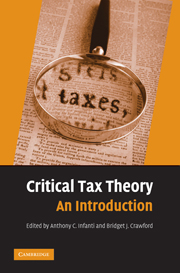Book contents
- Frontmatter
- Contents
- List of Illustrations
- List of Tables
- List of Contributors
- List of Common Abbreviations
- Introduction
- CHAPTER 1 FOUNDATIONS OF CRITICAL TAX THEORY
- CHAPTER 2 HISTORICAL PERSPECTIVES ON TAXATION
- CHAPTER 3 THE GOALS OF TAX POLICY
- CHAPTER 4 CRITICAL TAX THEORY MEETS PRACTICE
- CHAPTER 5 RACE AND TAXATION
- Tax Counts: Bringing Money-Law to LatCrit
- A Black Critique of the Internal Revenue Code
- The Marriage Bonus/Penalty in Black and White
- Tax and Race: The Impact on Asian Americans
- Race and Equality Across the Law School Curriculum: The Law of Tax Exemption
- Race and Class Matters in Tax Policy
- CHAPTER 6 GENDER AND TAXATION
- CHAPTER 7 SEXUAL ORIENTATION AND TAXATION
- CHAPTER 8 THE FAMILY AND TAXATION
- CHAPTER 9 CLASS AND TAXATION
- CHAPTER 10 DISABILITY AND TAXATION
- CHAPTER 11 GLOBAL CRITICAL PERSPECTIVES ON TAXATION
- CHAPTER 12 CRITICAL PERSPECTIVES ON CRITICAL TAX THEORY
- Index
Race and Equality Across the Law School Curriculum: The Law of Tax Exemption
Published online by Cambridge University Press: 04 August 2010
- Frontmatter
- Contents
- List of Illustrations
- List of Tables
- List of Contributors
- List of Common Abbreviations
- Introduction
- CHAPTER 1 FOUNDATIONS OF CRITICAL TAX THEORY
- CHAPTER 2 HISTORICAL PERSPECTIVES ON TAXATION
- CHAPTER 3 THE GOALS OF TAX POLICY
- CHAPTER 4 CRITICAL TAX THEORY MEETS PRACTICE
- CHAPTER 5 RACE AND TAXATION
- Tax Counts: Bringing Money-Law to LatCrit
- A Black Critique of the Internal Revenue Code
- The Marriage Bonus/Penalty in Black and White
- Tax and Race: The Impact on Asian Americans
- Race and Equality Across the Law School Curriculum: The Law of Tax Exemption
- Race and Class Matters in Tax Policy
- CHAPTER 6 GENDER AND TAXATION
- CHAPTER 7 SEXUAL ORIENTATION AND TAXATION
- CHAPTER 8 THE FAMILY AND TAXATION
- CHAPTER 9 CLASS AND TAXATION
- CHAPTER 10 DISABILITY AND TAXATION
- CHAPTER 11 GLOBAL CRITICAL PERSPECTIVES ON TAXATION
- CHAPTER 12 CRITICAL PERSPECTIVES ON CRITICAL TAX THEORY
- Index
Summary
What is the relevance of race to tax law? The race issues are apparent when one studies a subject like constitutional law. The Constitution concerns itself explicitly with such matters as defining rights of citizenship, allocating powers of government, and determining rights with respect to property. Given the history of our country – with slavery followed by periods of de jure and de facto racial discrimination – these constitutional law matters obviously must have racial dimensions.
Tax law, however, does not generally concern itself explicitly with matters of race. Tax law is often thought of as completely race neutral in that its rules do not explicitly hinge tax consequences on matters related to race. In fact, even though the Code refers to discrimination based on nonrace factors twenty-six times, it expressly refers to the concept of racial discrimination only twice, once with regard to racial discrimination by tax-exempt social clubs and once with regard to the foreign tax credit for taxpayers that participate in international boycotts that promote racial discrimination. But despite the paucity of express racial references in the Code itself, there are a myriad of implicit racial issues in tax law that mostly concern the federal tax imposed on individual income or wages. One well-known example is the racial bias inherent in the marriage penalty as a result of a combination of tax law rules and the lingering effects of slavery and postslavery discrimination against blacks. Though teachers of tax law are often quite familiar with this and with similar race issues related to the federal taxes imposed on individual income and wages, few are as familiar with the many ways in which race affects our understanding of tax laws that apply to organizations, particularly tax-exempt nonprofit organizations.
- Type
- Chapter
- Information
- Critical Tax TheoryAn Introduction, pp. 137 - 143Publisher: Cambridge University PressPrint publication year: 2009
- 2
- Cited by



